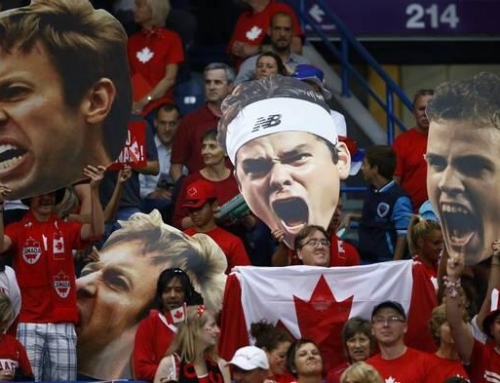Last year, in 2010, the current top two players of the world, Rafael Nadal and Novak Djokovic decided to play doubles at the Rogers Cup. Djokovic had been asking Nadal and Murray if they would play doubles, just for fun. The Rogers Cup is held in Canada, and the two were paired against an unheralded Canadian team. At the time, neither player was that well-known. Indeed, unless you really follow tennis, these names are still practically unknown.
The team was composed of two Canadians: Milos Raonic and Vasek Pospisil. Milos Raonic would make the fourth round of the Australian Open in 2011 and take a set off of David Ferrer. Pospisil would need to wait until this year’s to make a tiny breakthrough. As a wildcard, he beat Juan Ignacio Chela in the first round of the Rogers Cup. Chela is a top 30 player. Pospisil would then face Roger Federer and his run in his native tournament was over.
Raonic would also win his first tournament earlier in the year against Fernando Verdasco using his big serve to beat the nervous Spaniard. Alas, Raonic got hurt, and so he wasn’t able to play much of the hardcourt season nor the US Open. He was hoping to play Davis Cup against Israel.
You see, Davis Cup is actually a tiered event. While the big boys were playing to get into the Davis Cup finals, that would be Spain vs. France and Argentina vs. Serbia, there are also team trying to qualify to get into the World Group. This includes Switzerland which needed a win over Australia (historically, a Davis Cup superpower, but has struggled off-and-on with staying in the World group). Typically, you must play a relegation round if you lose in the first round of the Davis Cup, which means 8 teams who lose in the first round have to qualify. The Davis Cup is structured so the first round losers only have to win one Davis Cup tie to make it back, in their weird double-elimination style format.
It’s been years since Canada has made the World Group and they were hoping that Milos Raonic would be their grand hope. But, much like Novak Djokovic, Raonic was not healthy enough to fully play. Raonic played the lower ranked Amir Weintraub and lost in 4 sets. He took himself out of further Davis Cup play. Fortunately, his Davis Cup buddy, Vasek Pospisil, had already won against a solid Israeli player, Dudi Sela, in five sets. With Raonic out, Pospisil also did doubles duty, pairing up with doubles veteran, Daniel Nestor to take the doubles over Israeli Davis Cup doubles veterans, Erlich and Ram, 4-6, 6-3, 6-4, 6-4.
Without Raonic, Canada had to sub in Peter Polansky to play the reverse singles. He was not a match for the much higher ranked Dudi Sela and lost in straight sets, 6-3, 6-3, 6-3.
That left Pospisil to have to win his third match in three days over Amir Weintraub which he did, 6-2, 7-6, 6-4 popping in over 20 aces against the tenacious Israeli. Pospisil said this was his best result as a pro.
Many a sports commentator, focused on the top of the ranks, stare at Djokovic and Federer and Nadal, and see them as the necessary ingredients to a successful Davis Cup. And yet, there are teams like Canada, that only irregularly make the World Group in Davis Cup who find qualifying the biggest thrill of their lives. Davis Cup’s appeal and meaning is often far more important for countries that struggle year in and year out to get 2-3 reasonably good players that can make the journey. Indeed, of the Davis Cup crew, Daniel Nestor is the most heralded, but doubles only counts 1 out of the 5 matches. You typically need at least one other decently good player to make a good run.
As players like Nadal and del Potro bask in the glory of qualifying to reach the finals, there are lesser stories of Davis Cup heroics, including a young Canadian like Vasek Pospisil who do their part for their country and bring a little magic into the lives of those who care about tennis.
And what about the UK? Turns out they are at an even lower level than the Canadians. They are trying to move up to a level where they can even qualify for the World Group. Andy Murray teamed up with James Ward and doubles specialists, Fleming and Hutchins (who reached the US Open quarterfinals), to beat Hungary 5-0. Murray played Davis Cup for Great Britain in the previous round, and in both cases, played a played who had basically retired, or was only playing part-time. Murray is hoping that the next generation of British juniors get good fast. There are about 4 juniors playing top flight tennis and if they mature quickly, Britain may have a team that could consistently contend for the Davis Cup.




![[Davis Cup, QF, Day 3] Raonic wins over Seppi, clinches tie to move to semis](https://www.essentialtennis.com/wp-content/uploads/2013/04/20130407milos-500x383.jpg)
![[Davis Cup QF, Day 2] North American teams go the distance in doubles](https://www.essentialtennis.com/wp-content/uploads/2013/04/20130406serb-500x383.jpeg)
![[Davis Cup, 1R] Sam Querrey wins fifth rubber to advance US past Brazil](https://www.essentialtennis.com/wp-content/uploads/2013/02/20130203sam-500x383.jpg)
